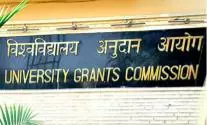
New UGC framework: Students can gain credits even from Vedas, Puranas

Students who are well versed in Vedas and Puranas can henceforth earn credits under the new National Credit Framework (NCrF) unveiled by the University Grants Commission (UGC).
The NCrF will integrate learning at multiple axes, such as academics, vocational skills, and even experiential learning, including proficiency in vocations.
According to the framework, even online, digital, and blended learning can now lead to credits and be accumulated.
The NCrF document has listed 18 major “vidyas” or theoretical disciplines and 64 “kalas” or applied sciences or vocational disciplines and crafts that can be considered for credit accumulation.
Also read: Over 200 universities on board for CUET-UG, up from 90 last year: UGC
The framework, which seeks to bring the school education system under a credit system, was put in the public domain by the UGC in October 2022 for feedback.
Educational credits
The NCrF has divided the learning ecosystem into eight levels, assigning credits based on learning hours from Class 5 up to PhD level.
“Till Class 12, each subject is assigned 240 hours for self-study at the school level. In higher education, it covers all undergraduate and postgraduate degrees, as well as PhD. Vocational education and skill training from levels 1 to 8 are also part of the framework now. Earning of credits will be based on total learning hours and assessments,” it said.
“Nothing is left unmeasured. Outside of classroom learning, sports and games, yoga, physical activities, performing arts, handicrafts, and bagless days will also be part of the evaluation framework,” the report said.
Also read: UGC chief: Indian varsities eyeing African, Gulf nations to set up campuses
The report puts the Indian knowledge system in the list, and that too under the “special achievers” category. This was not mentioned in the draft document released in October.
Among the other fields eligible for credits are sports and games, personalized arts, master craftsmen of heritage and traditional skills, social work in high-impact areas, such as education, healthcare, innovation and start-up.
The document stressed that credits must be awarded based on pre-defined learning outcomes along with criteria for special achievements.
Credit framework
The special achievement could be winning medals or holding positions in national or international events, awards conferred by Central or state governments or other recognised bodies and social work which could be assessed independently.
“The total credit points earned by a student will be the multiplication of total credits earned at a level of study or skilling and NCrF level assigned to that level of skilling and academic class. The framework also envisions taking into account cases wherein the student opts out of the education ecosystem and gains employment,” it said.
Also read: CUET-PG 2023: UGC announces online registration from March 20 to April 19
“At any point in time, the overall credit points accumulated by a student shall be calculated as total credit points earned multiplied by the weightage assigned to the relevant experience acquired by the student. Credits accumulated by any student shall be stored through Academic Bank of Credit,” it added.
The document stated that the transfer of credits is possible only when credits are recognized by the awarding bodies concerned and there is mutual agreement on credits between the body allocating credits and accepting those.
(With agency inputs)

